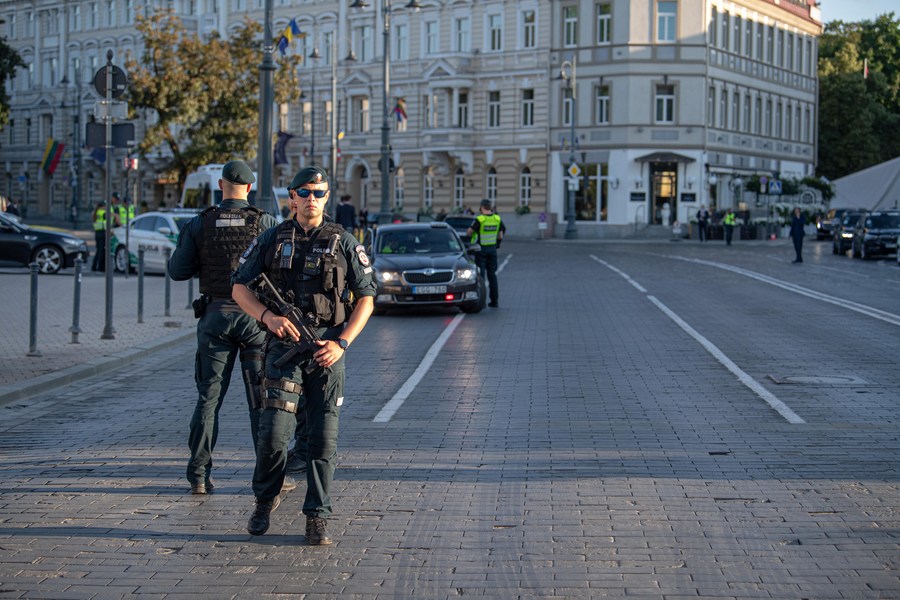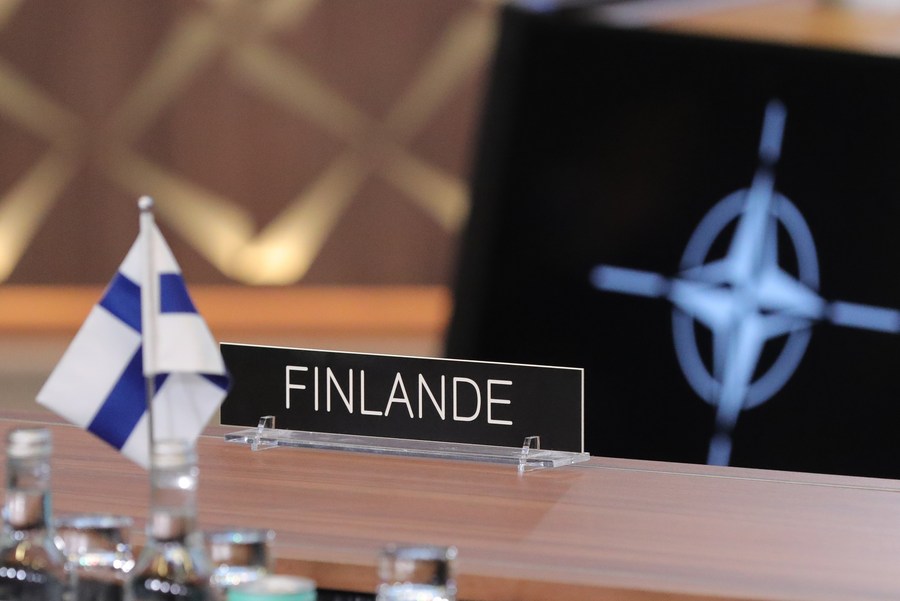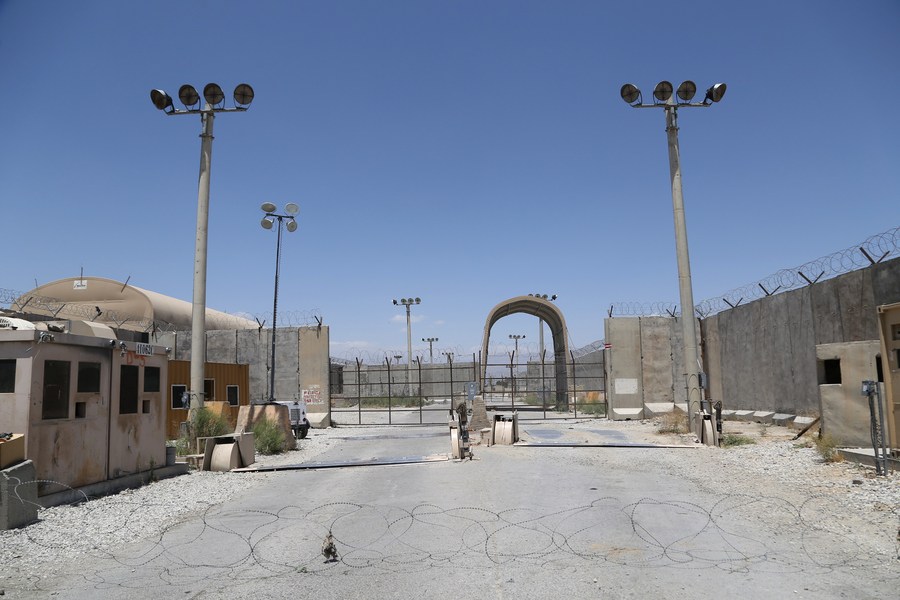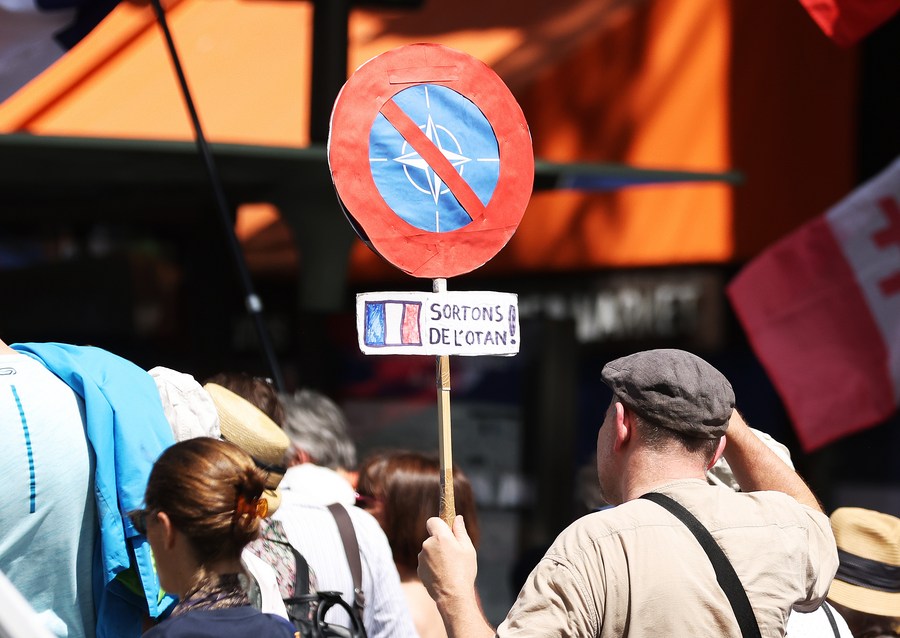* A long list of bloody wars and conflicts involving NATO countries suggests the bloc is more than a grave challenge to global peace and stability.
* “After the end of the Cold War, NATO should have logically disappeared, but it didn’t and is still looking for new enemies.”
As NATO held its annual summit on Tuesday in Vilnius, Lithuania, it would be a wake-up call to the peace-loving nations to take a glimpse of what the military bloc has bedeviled the world since the end of the Cold War.

Police personnel are seen on a street in Vilnius, Lithuania, July 10, 2023. (Xinhua/Alfredas Pliadis)
A long list of bloody wars and conflicts involving NATO countries suggests the bloc is more than a grave challenge to global peace and stability.
RECKLESS EXPANSION
NATO, as both history and relevant theories on military alliance would dictate, is destined to disintegrate once the Cold War ended. Unfortunately, this has not been the case. Far from disbanding, the alliance has been bent on reckless expansion.
NATO’s expansion has become a petri dish of conflicts and chaos. Experts say NATO’s eastward expansion and the pressure it has been exerting on Russia are to blame for the ongoing Ukraine crisis.
Since 1999, the bloc has made six eastward expansions, advancing more than 1,000 km all the way to the Russian border, thereby pushing Russia into a corner.
Even after the Ukraine crisis began, NATO has not slowed its pace with Finland officially accepted as its 31st member in April.

The national flag of Finland and emblem of NATO are seen at the NATO headquarters in Brussels, Belgium, April 4, 2023. (Xinhua/Zheng Huansong)
“Sizeable” is the culpability of the United States and its NATO allies, wrote Ted Galen Carpenter, a senior fellow for defense and foreign policy studies at the Cato Institute, after the Ukraine crisis broke out.
“Moving an alliance that one great power dominated to the border of another major power is inherently destabilizing and provocative,” Carpenter observed.
Many European countries had opposed NATO’s reckless expansion out of security concerns, but Washington apparently chose to turn a blind eye to the misgivings from across the Atlantic.
“The Americans wanted us to immediately integrate Ukraine in its entirety into NATO, and it was the French and the Germans who halted the idea, saying, non, beware, it’s very sensitive for Russia, and it must not be done so fast. Now in effect, we witness the prediction coming true,” said Pierre Conesa, a former senior official with the French Defense Ministry.
CULPRIT OF CONFLICTS
The U.S.-led NATO was the chief culprit of a series of brutal conflicts, putting in grave peril people’s lives in different parts of the world.
“NATO is not a defense alliance; it is an alliance which wages illegal wars,” said Sevim Dagdelen, a member of the German Left Party.
NATO forces launched 78 days of bombardment against Yugoslavia in 1999, causing over 8,000 civilian casualties and displacing about 1 million.
Other countries, including Afghanistan, Iraq and Libya, have also fallen victim to the U.S.-led NATO’s belligerence and violations of human rights.
In the two-decade-long Afghanistan war fought nominally to protect civilians, NATO’s airstrikes killed thousands of civilians.

This photo taken on July 2, 2021 shows the Bagram Airfield that served as a main U.S. and NATO forces base after all U.S. and NATO forces evacuated in Parwan province, eastern Afghanistan. (Xinhua/Sayed Mominzadah)
At the same time, the military alliance engages in an aggressive arms race and is thwarting all negotiation efforts related to the Ukraine crisis, Dagdelen added.
Despite all the chaos and conflict already inflicted, NATO is spreading its tentacles to the Asia-Pacific region with an express aim of containing China.
In recent years, NATO members continuously sent jets and warships for military exercises in China’s surrounding waters, which heightened tensions in the region.
Earlier this year, NATO announced the decision to set up a liaison office in Tokyo in 2024, which has triggered high alert among countries around the world, not least in the Asia-Pacific region.
As manifested in the wars outside the alliance area, NATO, under the leadership of the United States, aspires to worldwide influence and global hegemony, Dagdelen said.
“Japan is not located in the North Atlantic either. NATO’s desire for the Indo-Pacific to be in its zone of influence is part of this fatal expansion policy,” she said. “If we picture this conflict as a game of chess, then NATO is looking for pawns that can be sacrificed, if need be, to secure a better position.”
In a statement released by the public policy journal platform Pearls and Irritations on Monday, Former Australian Prime Minister Paul Keating also slammed NATO’s continued existence and its attempt to expand into Asia.
“Exporting that malicious poison to Asia would be akin to Asia welcoming the plague upon itself. With all of Asia’s recent development amid its long and latent poverty, that promise would be compromised by having anything to do with the militarism of Europe — and militarism egged on by the United States,” said Keating.
Leaders of regional countries like Singaporean Prime Minister Lee Hsien Loong also cautioned about the danger of being forced to pick sides in the bloc confrontation being forced upon the region by Washington.
MOUNTING CRITICISM
Given its spectacular acts of peace sabotage, the military bloc has been widely criticized for interfering in the internal affairs of other countries and undermining regional peace and stability.

People attend a parade against NATO in Paris, France, July 8, 2023. (Xinhua/Gao Jing)
“The problem with NATO is that we’re at the service of the person in charge, the United States, who are in favor of war. They want us to be at war all the time, and it doesn’t stop,” said Marie-Ange Le Fleche, a participant in a parade held in Paris last week against the military pact.
The continued existence of NATO means there will be no peace in Europe, said Pere Ortega, honorary president of the Delas Centre, adding that the submissive foreign policy of European countries is due to the armed military intervention of the United States and its NATO allies.
“The EU was founded to avoid intra-European conflicts, and the countries that are members of the EU have achieved this, which is the right path, but we have not been able to get rid of the U.S. military intervention,” Ortega told Xinhua in a recent interview.
“After the end of the Cold War, NATO should have logically disappeared, but it didn’t and is still looking for new enemies,” the expert said.
Shayne Heffernan









